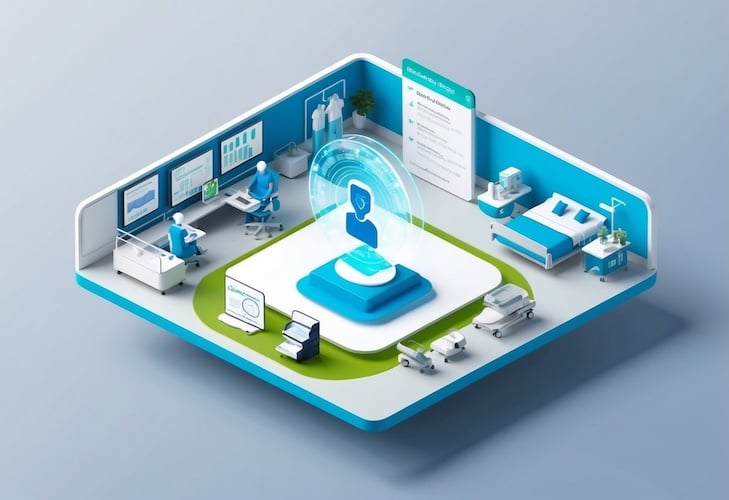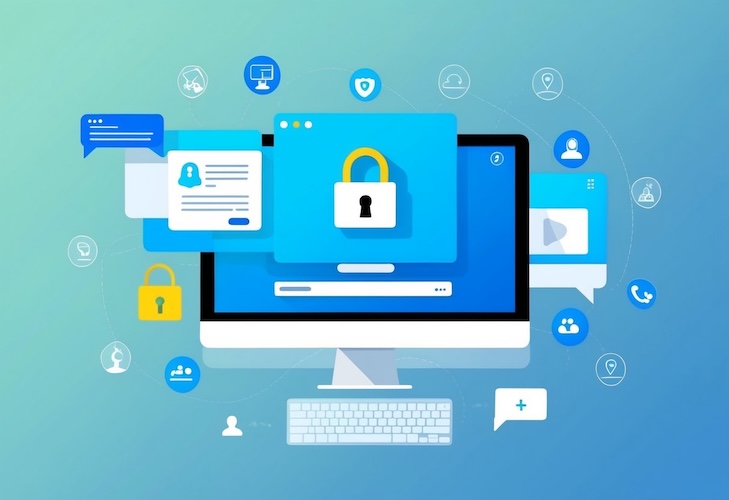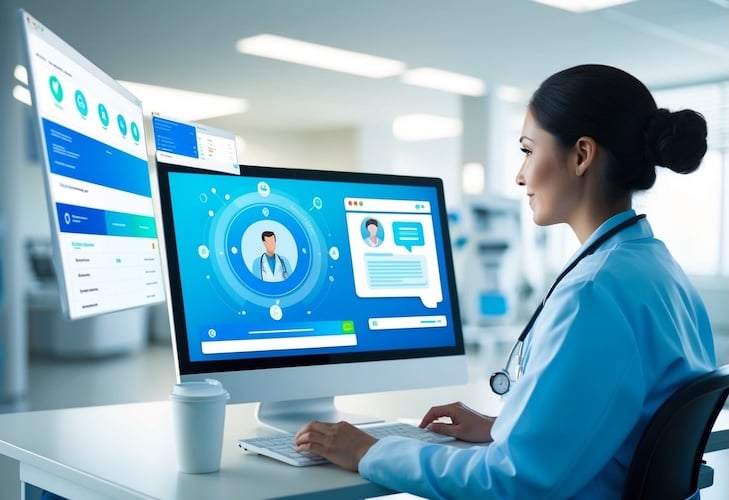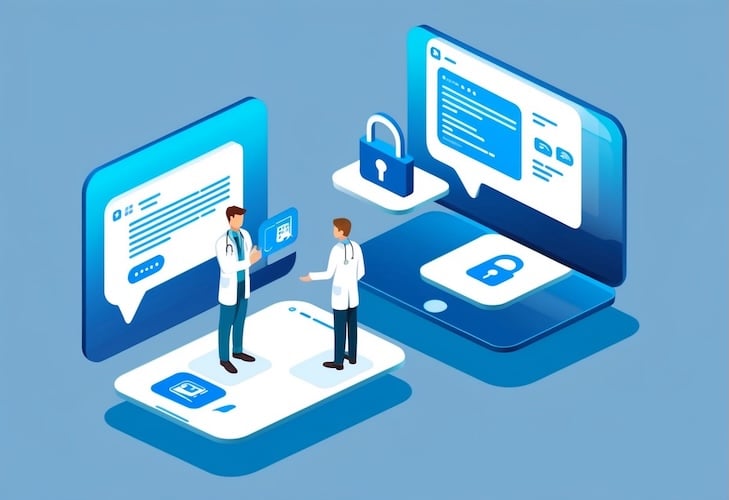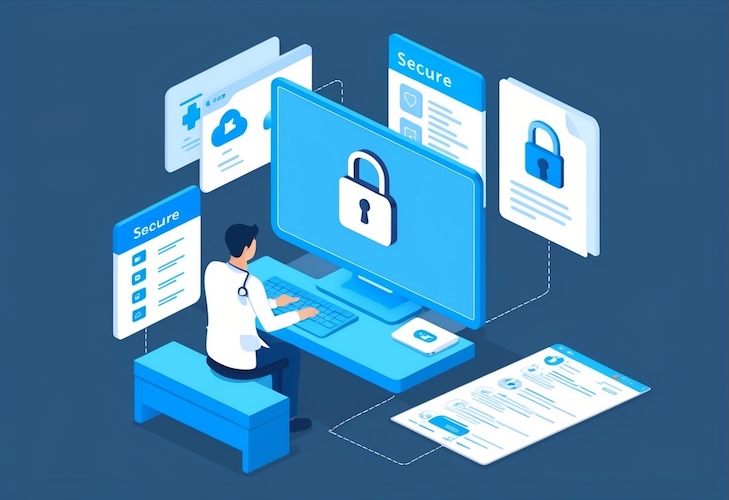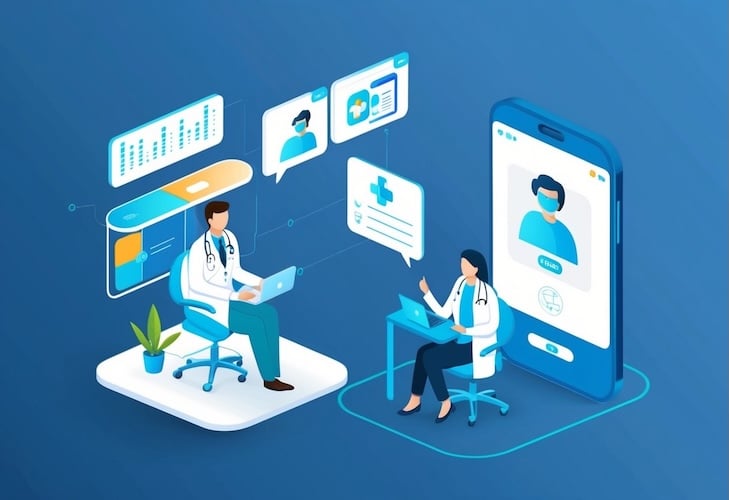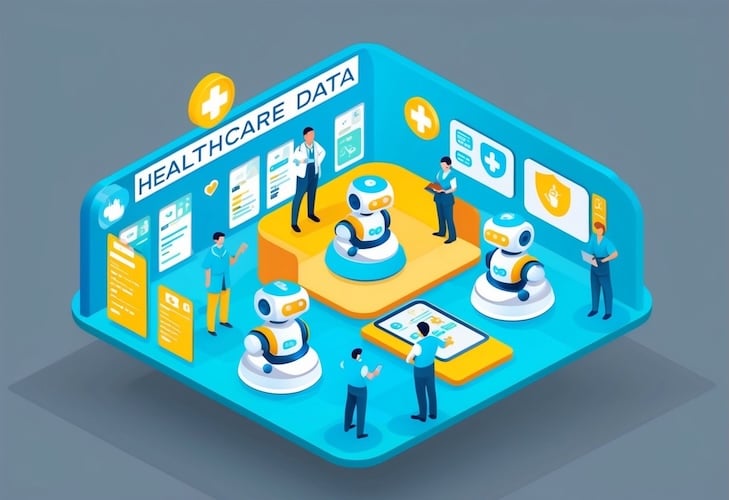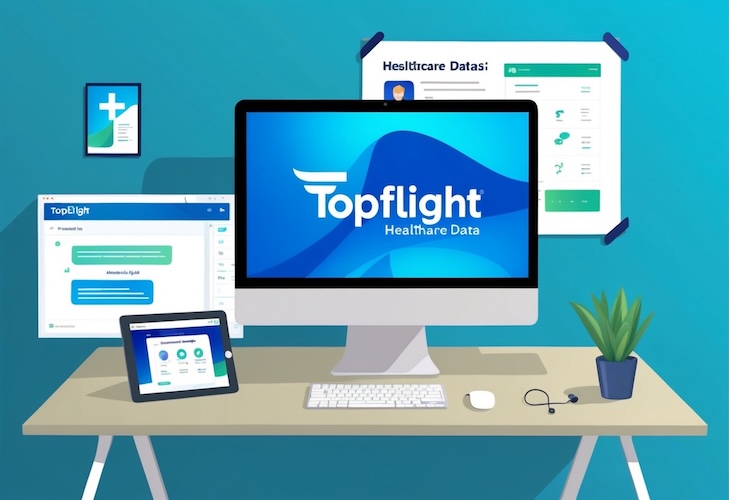In today’s digital world, questions like “Is ChatGPT HIPAA compliant?” highlight the delicate balance between healthcare innovation and data privacy, a task akin to walking a tightrope. Integrating ChatGPT into healthcare systems raises eyebrows, especially when HIPAA compliance makes the news for all the wrong reasons.
Currently, ChatGPT is not HIPAA-compliant out of the box and cannot be used to handle Protected Health Information (PHI) without significant customizations. Healthcare providers find themselves in a paradox where embracing AI means advancing patient care while potentially risking sensitive information.
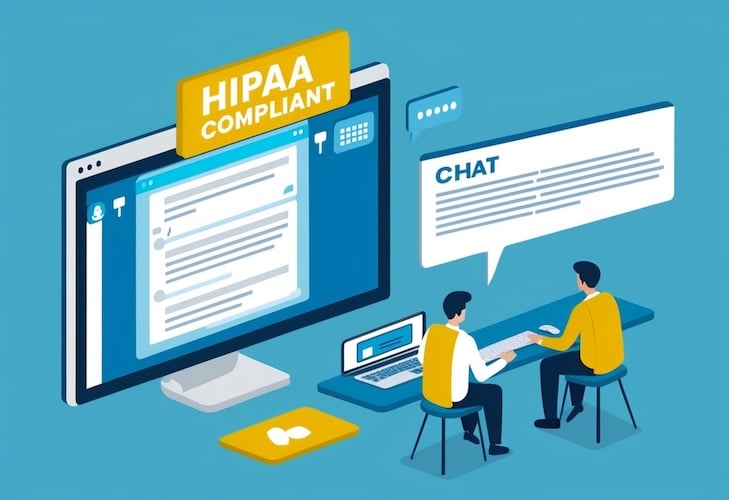
The allure of ChatGPT is undeniable—it promises unparalleled efficiency in managing medical records and documentation, patient interactions, and more. Yet the elephant in the room remains: how can you use such powerful technology without compromising patient confidentiality?
Some innovators believe crafting AI models specifically designed for the healthcare sector, like a private version of ChatGPT for healthcare professionals, could be a game-changer. This matchmaking of innovation with compliance ensures progress doesn’t come at the cost of privacy.
Fret not, decision-makers. Solutions exist for using AI like ChatGPT securely while respecting all those tedious HIPAA regulations. Navigating these murky waters becomes easier with a strategic approach: focusing on secure data storage, encryption, and constantly evolving AI methodologies. Understanding these intricacies not only safeguards patient trust but also positions you at the forefront of the healthcare revolution. Topflight’s expertise could just be the compass you need to lead your organization safely and securely into the AI era.
Key Takeaways
- Balancing Efficiency with Compliance: ChatGPT holds promise in streamlining tasks like medical record summarization and patient intake management, but organizations must ensure ChatGPT HIPAA compliance by integrating data encryption and anonymization protocols to avoid potential breaches.
- AI Customization for HIPAA Compliance: While ChatGPT isn’t HIPAA-compliant by default, customizing AI models tailored for healthcare, such as a HIPAA-compliant ChatGPT, can enable innovative uses like automated report generation and patient engagement without compromising sensitive data.
- Integrating AI in Healthcare Safely: Healthcare leaders must prioritize secure data handling when implementing ChatGPT and HIPAA solutions. Successful use cases, such as AI-assisted medical coding, rely on continuous monitoring and rigorous compliance with HIPAA’s data protection standards.
Table of Contents:
- ChatGPT and the Healthcare Revolution
- Generative AI and HIPAA
- ChatGPT in Healthcare: Opportunities And Challenges
- HIPAA Compliance with ChatGPT: Essential Considerations
- Best Practices for Using HIPAA-Compliant ChatGPT in Medicine
- ChatGPT Use Cases in Healthcare
- The Future of Generative AI in Healthcare: Balancing Innovation with Security
- How Topflight Can Help You Achieve HIPAA Compliance with ChatGPT
ChatGPT and the Healthcare Revolution
In the ever-evolving world of healthcare, artificial intelligence stands as a beacon of change, with ChatGPT leading the charge to transform administrative efficiency and patient interaction. As healthcare providers integrate these advanced tools, the importance of maintaining HIPAA compliance cannot be overstated—it’s the cornerstone of patient trust and data security.
The AI Era in Healthcare
The integration of AI is a mission-critical strategy for the future of healthcare. Here’s why using ChatGPT in healthcare matters:
- Digital Transformation as a Priority: Nearly 90% of healthcare leaders, spanning technical and non-technical roles, consider digital and AI transformation a top organizational priority.
- Massive Cost-Saving Potential: AI technologies, including machine learning and deep learning, could trim $360 billion in spending across healthcare.
- Rapid AI Adoption: The use of AI in healthcare has surged, with 31% of professionals now regularly using these tools, a notable increase from 16% the previous year.
- Resource Challenges: While 75% of executives see digital transformation as crucial, only a few feel prepared with the necessary planning and resources.
Perceptions vs. Investment: Although 88% of health executives recognize AI’s potential impact, 20% have no plans to invest in it over the next two years.
Legacy System Hurdles: Apart from budget constraints, outdated systems are a significant roadblock to successful AI integration and transformation.
Why Data Privacy Is Paramount
With AI tools like ChatGPT in play, healthcare organizations face both new opportunities and challenges, particularly regarding data privacy and compliance with HIPAA standards. It’s essential for decision-makers to balance innovation with stringent security measures to protect sensitive patient information.
Using HIPAA compliant ChatGPT technologies ensures that healthcare providers maintain the confidentiality and security expected in this highly regulated industry. Key actions include:
- Robust Encryption: Essential for safeguarding data at every stage of handling.
- Continuous Monitoring: Regular audits to pinpoint vulnerabilities and ensure compliance.
For those in healthcare seeking to leverage AI while ensuring patient data protection, Topflight offers unmatched expertise in HIPAA-compliant software development and as a seasoned healthcare app developer. We guide organizations in harnessing AI’s potential without compromising on security.
Generative AI and HIPAA
In the bustling corridors of the healthcare industry, Generative AI is strutting in like it owns the place, and for good reason. This technology promises to revolutionize how we manage data, streamline processes, and even how we interact with patients. But with great power comes great responsibility—or in this case, a serious HIPAA compliance checklist. Let’s dive into what Generative AI means for healthcare and why keeping your legal ducks in a row is more crucial than ever.
A Quick Refresher on HIPAA Compliance
Before we get carried away with the wonders of AI, let’s talk about HIPAA—the trusty, albeit sometimes confounding, rulebook for handling PHI. HIPAA is the guardian of patient privacy, ensuring that as we embrace new technologies, we don’t compromise on the sanctity of patient data. And with AI tools like ChatGPT entering the arena, the question on everyone’s mind is, “Is Chat GPT HIPAA compliant?” Spoiler alert: it can be, with the right setup and guidance.
Generative AI’s Role in Healthcare
Generative AI is creating a buzz in the healthcare sector for its ability to drive efficiency and innovation. Its potential is vast, from generating personalized treatment plans to enhancing diagnostic accuracy. However, diving headfirst into AI adoption without a solid compliance strategy is like jumping into the deep end without a life jacket. Here’s what the landscape looks like:
- Cautious Investment: The majority of organizations in healthcare, pharmaceutical, and medical products are treading carefully with AI investments (most don’t use ChatGPT and similar tools at all).
- Budget Allocation: 61% of respondents plan to allocate less than 5% of their digital budget to generative and analytical AI.
- Leading Innovators: Only a small group of ‘mold breakers’—around 18%—are leading the charge, investing more than 10% of their digital budget in AI.
These insights highlight the need for a balanced approach, ensuring that innovation doesn’t outpace compliance.
Striking a Balance Between Innovation and Security
Clinical technology leaders and senior product decision-makers in healthcare organizations are caught in a delicate dance—embracing innovation while ensuring compliance. As you weigh the benefits of using ChatGPT and other AI tools, the priority should be on safeguarding patient data. Here’s where Topflight comes in. Whether you want to build a HIPAA-compliant app or integrate a HIPAA-compliant video conferencing messaging API SDK, we’ve got the expertise to help you navigate these choppy waters.
Ultimately, the secret sauce lies in blending cutting-edge AI with robust compliance strategies. By doing so, healthcare organizations can not only stay afloat but lead the charge in transforming healthcare delivery while keeping patient trust intact.
ChatGPT in Healthcare: Opportunities And Challenges
In the ever-busy world of healthcare, ChatGPT is becoming a trusty sidekick, helping professionals manage an array of tasks with ease. But like any good partnership, it comes with its own set of challenges. Let’s explore how AI language models like ChatGPT are shaping the future of healthcare and the hurdles organizations must navigate to keep everything compliant and secure.
Streamlining Administrative Tasks
ChatGPT is stepping up to streamline healthcare workflows, making it possible to automate patient queries and summarize medical records efficiently. Its capabilities in processing health information are proving to be game-changers:
- Automate Patient Queries: ChatGPT can answer routine questions, freeing up valuable time for healthcare professionals to focus on more complex patient needs.
- Medical Record Summarization: By quickly condensing patient data, ChatGPT ensures that practitioners have the right information at their fingertips.
But leveraging these capabilities isn’t just about flipping a switch. It’s crucial to ensure that the implementation of AI respects HIPAA compliance, maintaining the confidentiality and security of PHI.
Tackling PHI Challenges
Handling PHI in this digital age comes with its own headaches. There’s a tightrope to walk between efficiency and compliance. Here’s what healthcare executives think:
- Boost in Productivity: A whopping 94% of executives believe AI will enhance productivity and efficiency, allowing staff to focus on higher-value tasks.
- Concerns Over Personalization: Despite the optimism, 83% worry about AI’s role in personalizing medical plans or aiding diagnoses. Human oversight remains paramount to ensure AI tools like ChatGPT complement rather than complicate care.
For those ready to dive into AI, solutions like automate patient intake management and clinical trial software development are available to help navigate these challenges.
Bridging the Gap Between Patients and Providers
ChatGPT’s potential to enhance patient engagement is vast. By offering quick, accurate responses and reducing wait times, it helps bridge the gap between patients and healthcare providers. Yet, ensuring secure data exchange, especially when integrating complex systems, is critical. For example, integrate a health app with Epic EHR solutions can ensure seamless and secure data flow.
Ultimately, while the journey of integrating AI into healthcare is filled with twists and turns, the rewards are significant. By partnering with experts in ChatGPT HIPAA compliance and AI technology, healthcare organizations can confidently harness the power of AI language models like ChatGPT to transform their operations and enhance patient care.
HIPAA Compliance with ChatGPT: Essential Considerations
Navigating the complex waters of HIPAA compliance while implementing AI tools like ChatGPT can feel daunting. Yet, with a focused approach on technical safeguards, healthcare organizations can confidently embrace AI innovations. Let’s delve into the core components required to ensure ChatGPT remains HIPAA-compliant, safeguarding patient information with the utmost care.
Encryption: Your First Line of Defense
Encryption plays a pivotal role in protecting data integrity and confidentiality. When deploying ChatGPT, ensuring end-to-end encryption is paramount to prevent unauthorized access to sensitive information. This approach helps in maintaining trust and compliance with HIPAA regulations.
Data Anonymization: A HIPAA Must-Have
Data anonymization is another critical step in the AI journey. By stripping away identifiable information, healthcare providers can utilize ChatGPT for data analysis without the risks associated with handling protected health information. This balance allows AI to assist in providing insights while maintaining patient privacy.
Managing Third-Party AI Tools
When considering third-party AI solutions for ChatGPT and HIPAA, healthcare organizations face a choice between speed and customization. According to the 2024 McKinsey Global Survey on AI:
- Off-the-Shelf Solutions: 53% of organizations prefer ready-made AI tools for quick deployment.
- Custom Models: 47% engage in developing proprietary models or perform extensive customization to tailor AI capabilities to specific needs.
This trend indicates a strategic preference that balances rapid deployment with the need for tailored solutions.
Vetting Providers for HIPAA Compliance
Choosing the right AI partner is crucial. Ensure your vendor demonstrates a robust understanding of HIPAA regulations and offers solutions that meet these standards. For instance, for medical billing software development or healthcare mobile app design, it’s vital to work with experts who prioritize data security and compliance.
PHI Management
Handling PHI requires meticulous attention to detail. Implement systems that monitor and audit access to sensitive data, ensuring that any use of AI, like ChatGPT, remains within the bounds of HIPAA compliance. This is crucial as AI adoption continues to rise. As noted, “According to the 2024 McKinsey Global Survey on AI, in healthcare, pharmaceuticals, and medical products, only 31% of respondents report regularly using AI in their work or personal lives. While this is nearly double the 16% from 2023, it highlights that AI adoption, though growing rapidly, is still in its early stages.”
For those taking steps to build a doctor appointment app or explore doctor-on-demand app development guide, ensuring HIPAA compliance is a non-negotiable part of the process.
By focusing on these essential considerations, healthcare leaders can leverage ChatGPT and similar AI technologies effectively, aligning with HIPAA’s stringent requirements while paving the way for innovation and improved patient outcomes.
Best Practices for Using HIPAA-Compliant ChatGPT in Medicine
Implementing ChatGPT in a healthcare setting can revolutionize the way organizations manage patient interactions and data. However, ensuring HIPAA compliance is crucial to avoid violations. Here are some best practices for deploying ChatGPT without compromising on data security.
Implementing ChatGPT the Right Way
Avoiding common pitfalls in HIPAA compliance starts with a clear strategy:
- Third-Party Oversight: Engage with third-party vendors who have proven records in maintaining HIPAA standards. This ensures that any external contributions align with your internal compliance goals.
- Secure Hosting: Opt for secure and reliable hosting solutions that offer end-to-end encryption and regular security audits. This minimizes the risk of data breaches and unauthorized access to health information PHI.
- Staff Training: Ensure your team is well-versed in using AI-driven tools. Regular training sessions help staff understand the nuances of HIPAA ChatGPT applications, promoting a culture of compliance.
Building a Culture of Compliance
Creating a robust compliance culture is essential. Here are some key points to consider:
- Comprehensive Staff Training: Continuous education on HIPAA regulations and AI tools helps employees make informed decisions, reducing the risk of accidental violations.
- Monitoring and Auditing: Regularly audit AI performance and data handling processes to identify and address potential compliance issues swiftly.
Addressing Data Governance
Data governance remains a significant challenge. In fact, 70% of Gen AI high performers report challenges with data governance, rapid integration into AI models, and insufficient training data, underscoring the critical role data plays in driving value. To tackle these challenges leverage:
- Data Management Policies: Implement strict data management policies that define how health information PHI is collected, processed, and stored.
- Integration with Existing Systems: Seamless integration with EHR systems, e.g., EHR PointClickCare integration, is crucial for maintaining data integrity and continuity of care.
Leveraging Technology for Compliance
Utilize cutting-edge technology to maintain compliance while enhancing service delivery:
- Developing Telehealth Solutions: You can create a telehealth app using tools that facilitate remote patient care while adhering to HIPAA standards.
- Enhancing Communication: Use conversational AI in healthcare to improve patient interaction, ensuring that all digital dialogues are secure and compliant.
- Optimizing Web Presence: A medical website development strategy that prioritizes HIPAA compliance can enhance patient trust and engagement.
By following these best practices, healthcare organizations can integrate ChatGPT effectively and safely, leveraging its full potential while remaining compliant with HIPAA regulations. This balanced approach not only safeguards patient data but also positions organizations at the forefront of healthcare innovation.
ChatGPT Use Cases in Healthcare
When implemented in a HIPAA-compliant way, ChatGPT offers transformative potential for healthcare organizations, enabling everything from medical chatbot development to streamlining telemedicine services. Below are several real-world use cases that demonstrate how ChatGPT is revolutionizing healthcare operations while safeguarding data privacy and security.
Streamlining Patient Intake
ChatGPT can automate patient intake processes, allowing healthcare providers to gather preliminary information from patients before their appointments. This reduces administrative work and minimizes waiting times, all while ensuring PHI remains protected.
Enhancing Telemedicine Platforms
Many of the best telemedicine apps are now integrating AI for better patient triage and follow-up recommendations. ChatGPT can assist in automating scheduling, symptom checking, and initial diagnosis, improving the overall telemedicine experience while staying HIPAA-compliant.
Medical Chatbots for Patient Support
Through medical chatbot development, AI-driven tools are being used to answer common patient queries in real-time, thus reducing the workload on clinical staff. HIPAA-compliant chatbots can handle sensitive health questions and provide timely responses without compromising patient data privacy.
Automated Medical Report Generation
Another emerging use case is the automatic generation of medical reports. ChatGPT can summarize patient data, lab results, and physician notes into coherent reports. These reports can then be securely shared with clinicians for faster decision-making, significantly reducing administrative overhead while maintaining HIPAA compliance.
AI-Assisted Medical Coding
ChatGPT is being explored for its potential in automating medical coding tasks, helping to improve accuracy in billing and claims processes. By integrating ChatGPT into back-office workflows, healthcare providers can streamline coding operations without compromising sensitive data, adhering to HIPAA standards throughout.
Lowering App Development Costs
Incorporating AI solutions like ChatGPT into healthcare often prompts concerns about app development costs. However, by building on secure, HIPAA-compliant frameworks, healthcare organizations can scale their AI tools without facing skyrocketing budgets, enabling a balance between innovation and cost-efficiency.
Topflight ensures that all AI solutions, including ChatGPT in healthcare, meet HIPAA compliance requirements, enabling healthcare organizations to leverage AI without compromising data security.
By implementing a HIPAA compliant chat GPT instance, healthcare organizations can harness the full power of AI while safeguarding sensitive patient information and ensuring regulatory compliance.
The Future of Generative AI in Healthcare: Balancing Innovation with Security
As healthcare technology continues to evolve, the integration of generative AI like ChatGPT presents both exciting opportunities and regulatory challenges. For healthcare decision-makers and technology leaders, understanding and navigating these complexities is crucial for leveraging AI responsibly.
AI Regulation on the Horizon
In 2024, the regulatory landscape for AI in healthcare is poised for significant changes. New frameworks such as TEFCA (Trusted Exchange Framework and Common Agreement) are shaping the landscape of healthcare interoperability, creating opportunities for secure, AI-driven solutions. This initiative complements existing HIPAA regulations by enhancing secure and compliant data exchange, a critical aspect for healthcare professionals.
- TEFCA’s Role: Supports secure data exchange and interoperability, enabling innovative AI applications while ensuring compliance.
- Ongoing Compliance: Continual adaptation to emerging regulations remains essential to maintain both privacy and security.
Security-First AI Developments
Ensuring the privacy and security of patient data is paramount. According to McKinsey’s “State of AI in Early 2024” report, concerns around inaccuracy and intellectual property infringement are significant in the use of generative AI. Nearly half of respondents still identify cybersecurity as a key risk area.
- Risk Mitigation: Implement robust encryption and data anonymization strategies.
- Security Assessments: Regular audits and updates to AI systems can preempt potential vulnerabilities.
The Long-Term Vision
Generative AI has the potential to revolutionize healthcare, driving innovations from chatbots in healthcare to medical practice automation and AI in medical billing and coding. Effective integration of AI can streamline operations, enhance patient engagement, and optimize billing processes.
- Automation in Practice: AI-driven tools can significantly reduce administrative burdens.
- Enhanced Patient Engagement: Chatbots provide personalized patient interactions, improving satisfaction and outcomes.
By staying informed about regulatory developments and adopting a proactive approach to AI integration, healthcare organizations can charge into a future where innovation and compliance coexist seamlessly.
Balancing these elements will ensure that healthcare organizations not only comply with Chat GPT and HIPAA requirements but also harness the full transformative power of AI.
How Topflight Can Help You Achieve HIPAA Compliance with ChatGPT
Navigating the complex landscape of AI integration in healthcare requires a partner with deep expertise in HIPAA compliance and innovative technology solutions. At Topflight, we specialize in developing AI solutions tailored to meet the stringent needs of healthcare organizations, ensuring that your deployment of ChatGPT is both effective and compliant.
Customized AI Solutions for Healthcare
Our approach is never one-size-fits-all. We understand the unique challenges faced by healthcare technology leaders and decision makers, which is why we offer bespoke AI solutions that align with your operational goals and compliance requirements.
For instance, with GaleAI, we’ve implemented advanced data anonymization and other cutting-edge techniques to ensure that our solutions not only meet but exceed HIPAA standards.
- Tailored Strategies: Each solution is customized to fit the specific needs and regulatory environment of your organization.
- Proven Techniques: Our methods, like those used in GaleAI, ensure state-of-the-art data protection.
Ensuring Compliance from Day One
We prioritize data security and compliance from the very start of any project. Through rigorous processes and a commitment to excellence, we ensure your ChatGPT implementation is seamless and secure.
- Data Security: Robust encryption and privacy measures are integral at every stage of development.
- Continuous Monitoring: We provide ongoing audits and support to maintain compliance and address any emerging challenges.
According to Bain’s Quarterly Executive Survey on AI, the primary obstacle slowing generative AI adoption is the lack of readiness in companies’ existing technology platforms. At Topflight, we bridge this gap by providing the necessary technological foundation to support advanced AI tools like ChatGPT, thereby enabling a smooth transition to future-ready, compliant solutions.
In a world where healthcare innovation and regulatory oversight are ever-evolving, Topflight stands as a trusted partner. By integrating HIPAA and ChatGPT considerations into our development process, we empower healthcare organizations to leverage AI’s transformative potential while maintaining unwavering commitment to data privacy and security.
Frequently Asked Questions
What security measures are necessary when using ChatGPT in medical communications?
Implement robust encryption, access controls, and data anonymization to protect patient information and ensure compliance with HIPAA regulations.
Can ChatGPT store and process PHI under HIPAA regulations?
Yes, but only if configured with appropriate security measures like encryption and access control to safeguard PHI and comply with HIPAA.
What are the consequences of non-compliance with HIPAA when using ChatGPT in healthcare settings?
Non-compliance can lead to significant fines, legal action, and damage to reputation, emphasizing the importance of robust security measures.
How does encryption play a role in ChatGPT's HIPAA compliance for data transmission?
Encryption ensures that data is securely transmitted, protecting patient information from unauthorized access and aligning with HIPAA requirements.
What training should staff undergo to safely use ChatGPT in handling PHI?
Staff should receive training on data privacy policies, secure use practices, and recognizing potential security threats to ensure PHI protection.
Are there any specific documentation requirements when deploying ChatGPT in a HIPAA-compliant environment?
Yes, maintain thorough documentation of security protocols, staff training, and data handling practices to demonstrate compliance with HIPAA standards.
